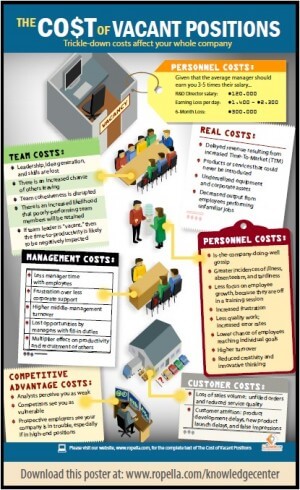 As the end of another challenging year in the nutraceutical industry comes to a close, for many managers, it’s about to get tougher before it gets easier. I’m talking about the two words that strike fear in the hearts of just about every employee, and throw a kink into the schedule of every busy manager—performance appraisals. In the past, employee reviews have been seen as a useless task imposed upon management by HR. If not executed the correct way, they can be uncomfortable, impractical, and an overall nuisance. Everyone wants to avoid them, but they are a necessary part of running an effective team.
As the end of another challenging year in the nutraceutical industry comes to a close, for many managers, it’s about to get tougher before it gets easier. I’m talking about the two words that strike fear in the hearts of just about every employee, and throw a kink into the schedule of every busy manager—performance appraisals. In the past, employee reviews have been seen as a useless task imposed upon management by HR. If not executed the correct way, they can be uncomfortable, impractical, and an overall nuisance. Everyone wants to avoid them, but they are a necessary part of running an effective team.
In this month’s column I’m here to present you with some information that will not only make performance reviews easier to conduct and more effective, but will change the perception of the annual review from a necessary evil into a powerful catalyst that dramatically improves communication and spurs company performance.
Communication is Critical
What’s the difference between a constructive, empowering, and satisfying performance evaluation and one that leaves both the supervisor and the employee feeling like they’ve just wasted their time? In a word, communication. The degree and level of communication determines the effectiveness of the review process. If you merely deliver your perceptions about the employee’s work performance, most likely they won’t match with the employee’s perceptions. Miscommunication occurs, and a substantial gap between the two of you results.
An effective evaluation is collaborative—a dialog needs to take place. During the course of an appraisal, verify that you both understand and agree with the data being presented. You lead this process, but give your employees an opportunity to offer constructive feedback. The objective is always to seek and reach mutual understanding on past performance and future goals, and to share feelings and ideas in an open and comfortable forum.
Be Specific
To eliminate or reduce most miscommunication, be specific. For instance, it’s not helpful to say that the employee is “often late for work.” To have a constructive discussion about tardiness, cite specific times and dates when the employee was late. And remember to focus on the results, not the excuses.
In the case of exemplary behavior, the same thing holds. Describe specific things the employee did that actually contributed toward the effectiveness of the organization. It’s not enough to say that the employee has a “good attitude.” In what ways was this attitude demonstrated on the job, and why did it help? Employees need to hear specifics.
Focus on Hard Numbers
All jobs are measurable and all goals must be quantified. Obvious advice? Yes—but how many of your reviews become too subjective? Hard numbers are the most effective and most objective way to gauge results. If you’re reviewing a chemist or an R&D engineer, quantifying his or her output is probably a simple matter. The challenge is to develop objective measures for soft goals.
For example, a project manager might have a goal to complete projects on time and within budget. Consider developing a scoring system, like the example below:
5 =100% on time, some under budget
4 =100% on time and on budget
3 =90% on time or on budget
2 =80% on time or on budget
1 =less than 80% on time or on budget
By focusing on measurable results, you can better determine standards for exceptional, average, and sub par performances.

Accountability and Rewards
Avoid surprises
One of the central goals of a performance appraisal is to avoid surprises. When it’s time for the annual review, both you and the employee should have a good understanding of what’s going well, what’s not going so well, and what can be done differently. In addition, the employee should already know the rewards for good performance and the consequences of below average work. The review is not the time to unveil unknown information; rather, you should concentrate on the past year’s performance and develop a plan for reaching next year’s goals.
Praise effort, reward results
Effort is a necessary requisite for job success, but it is not a sufficient one. Praise employees who try hard, but reward only those who produce results. Establishing a “results = rewards” policy motivates your employees to try and to succeed. It also increases the perception of fairness.
Hold people accountable
You’ve clearly defined goals for your employees, and you’ve quantified their performance. If results are lacking, have the courage to hold people accountable. No one wants to play the villain, but if you cover shortfalls and remedies in a professional manner, conscientious employees can use the feedback to improve. And those who don’t progress have no excuse if you are forced to terminate them.
Importance of Planning
The greatest benefit of a review session is the opportunity it provides for planning the employee’s future goals. A good plan keeps you and the employee focused on the right things and helps turn the review process from something that happens once a year to a dynamic and collaborative effort.
SMART planning
Planning for both professional goals and personal development should be SMART—an acronym for Specific, Measurable, Acceptable, Realistic, and Time-bound:
- Specific A goal to “work harder” is ambiguous; a goal to “Adhere 100% to established procedures, policies & SOPs to ensure regulatory compliance” is not.
- Measurable It is easier to understand the effort involved in reaching a goal if the desired result is measurable (e.g., Meet 80% of deadlines for new product development).
- Acceptable An employee will take responsibility for pursuit of a goal only when that goal is acceptable to him or her. To gain acceptance, it’s critical to involve the employee in the goal setting process.
- Realistic Even if an employee does accept responsibility to pursue a goal that is specific and measurable, it won’t be useful if it is not realistic. Increasing production by 15% over the next year may be attainable; increasing it by 15% within the next week is not.
- Time-bound Without a time deadline, a goal has no built-in performance accountability.
Resource needs
Goals are worthless if the employee doesn’t have the necessary tools to reach them. That’s why good planning also means developing a list of resources needed to achieve the performance goals, including training, capital equipment, management support, and time.
Milestones
Be careful that agreed-upon goals don’t overwhelm the employee. Often, it’s helpful to break yearly goals into quarterly and monthly objectives. Such a process helps you monitor progress and achievement throughout the year. It also provides concrete data for the next evaluation.
Below is a checklist that will help you navigate your way through the review, and cover all of the areas that need to be reviewed in a consistent manner with each employee.

Checklist for Performance Reviews:
- Discuss the employee’s primary responsibilities in the past year. (A written summary of responsibilities should be provided to the employee.)
- Discuss how they relate to overall objectives.
- Discuss employee’s strengths / areas for growth in the five general performance categories.
- Discuss employee’s significant accomplishments from the past year.
- Discuss possible ways to improve performance.
- Discuss barriers to effective work performance and job satisfaction in the past year.
- Discuss employee’s goals and needs for the next review period.
- Discuss long term career goals and development needed to achieve them.
- Discuss employee’s feedback / suggestions for supervisor.
- Discuss anything else the employee or supervisor would like to address.
- Complete Performance Review forms. Attach supplementary documents: employee self-evaluation, position-specific factors, plan of improvement, or other accompanying documentation of performance.
With a little effort, planning, and perseverance, performance reviews no longer have to be the annual exercise in futility and discomfort they once used to be. Use every review as an opportunity to interface with your staff on a more personal level and work toward the goal of open communication. Within a short period of time, you’ll begin to reap the benefits!



